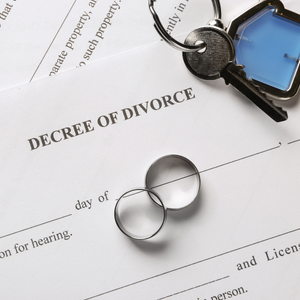
Understanding the Legal and Practical Considerations of Selling a Home During Divorce
In Georgia, selling a house in divorce involves an intricate interplay of legal, fiscal, and emotional components. The state observes equitable distribution principles, meaning that marital property, including the house, will be divided fairly but not equally.

Before listing the house, both parties must reach a consensus regarding the sale and its terms. If there is a disagreement, a court may need to step in. Since it is customary for both spouses to possess rights to the shared home until the divorce is finalized, cooperation is essential for signing listing agreements, pricing choices, and negotiations.
Divorce attorneys or real estate lawyers specializing in Georgia’s divorce law will understand the intersection. They will assist in resolving disputes arising from mortgages, liens, and the division of sale proceeds and comply with defined orders. A divorce real estate professional can offer a pricing strategy and sensitive sale execution with appropriate market perspectives.
Due to potential tax liabilities and overall ramifications for the divorce settlement, timing the sale relative to the divorce is also essential. Careful communication, documented agreements, and dispute professional intervention minimize disagreement via a streamlined process.
Timeline for Selling a House Before Finalizing Divorce in Georgia
Selling a house shares common traits with divorce; both require careful planning and consideration, and must be dealt with synchronously. In Georgia, the equitable distribution policy governs the state’s divorce laws. Thus, spouses working on finalizing a divorce should understand that there is a clear distinction between marital property.
Spouses must reach a consensus on selling the home and bidding an amicable amount to divide their profits. To maximize their returns, Georgia homeowners must consider the prevailing market conditions to determine the most opportune time for sale.
A real estate expert with experience of the trends in the local market can best advise on the period and pricing to set a listing. They also ensure that agreements adhere to court regulations throughout the process and protect the parties’ interests.
Contacting tax advisers ensures all ends are covered, including the mortgage, tax, and debt obligations. Knowledge of these aspects allows a divorcing couple to sell the house effortlessly while complying with the set rules in Georgia easily.
For homeowners looking to skip the stress of listing, showings, and negotiations during a divorce, companies like Yellow Card Properties offer a hassle-free solution by buying homes for cash in Richmond Hill, making it easier to move on with peace of mind.
Navigating Joint Property Sales When Divorcing in Georgia
Selling joint property like a house can be complicated when divorcing in Georgia. Georgia distributes marital assets, including real estate, equitably but not evenly.
Homeowners must first decide if the property is marital or separate based on when it was bought and how it was used. They must also determine the property’s market value.
A professional appraiser is usually hired before selling to ensure an appropriate appraisal. Couples should also examine how to handle mortgages after the sale.
A family law attorney versed in Georgia divorce laws can assist homeowners in negotiating and preserving their financial interests while following court orders. Mediation can also help reach settlements without litigation.
Understanding these crucial factors can help Georgia divorcees resolve their shared house.
Financial Implications of Selling Your Home Before Divorce Completion
Georgia homeowners must carefully evaluate the financial repercussions of selling their property before divorcing. The house is generally one of the most valuable marital assets, so an asset split is a significant problem.
Strategically timing the sale could alter each party’s proceeds, affecting settlement negotiations. Understand tax implications, especially capital gains taxes, and how they apply to house sale earnings after divorce.
Owners should also consider ongoing mortgage payments and related costs, such as realtor fees and repairs, which may affect net income. Sellers should consider Georgia’s real estate market, as property valuations might affect financial results.
Real estate professionals and attorneys can provide customized advice and ensure compliance with state laws during this transfer.
Selling Real Estate During Divorce in Georgia: Legal Hurdles and Practical Preparation

In Georgia, selling a marital home during or after divorce is laden with legal complications and difficulty associated with planning. Regarding property distribution, Georgia’s “equitable distribution” also considers the financial effort and other contributions a spouse makes towards the marital home. One spouse retains the house while the other is compensated with other assets.
Each spouse captured in the mortgage and deed must consent to the refinance agreement for sale or refinancing. Without collaboration, there are delays, financial losses, or a need for court intervention. If the property is sold, the division of proceeds and capital gains taxation must be examined closely, particularly when the property’s value has increased.
Regarding property maintenance, proactively tending to the house ensures a quicker sale. Form an action plan to stage and remove excess belongings to enhance appeal. Fix major issues in plumbing, electricity, and roofing that lower marketability. The development of a marketing strategy, setting a reasonable and competitive listing price, and performing a local market analysis should be done by a competent real estate expert.
Both parties should keep communication channels open and ensure that important documents such as legally binding contracts, mortgages, titles, and prenuptial agreements, if they exist, are filed in an orderly manner. Legal professionals specializing in family law and real estate are indispensable in assuring compliance with Georgia legal statutes and ensuring the transaction processes are executed efficiently in real time, even when personal emotions are running high.
The Role of a Real Estate Professional in Divorces Involving Property Sales
Georgia house sales before divorce require a qualified real estate expert. A divorced homeowner selling their house needs an experienced professional to ensure a fair deal.
A real estate professional can objectively assess the home’s market value and help divorcing couples determine a listing price that attracts buyers and maximizes profits. They use techniques to attract purchasers despite emotional or psychological issues between the separating partners to promote the home.
They also negotiate well with prospective buyers to deliver proposals fairly and honestly to both divorce parties. A competent professional reduces homeowner stress by reducing communication and scheduling problems through efficient open house and viewing coordination.
Their knowledge of Georgia’s real estate laws helps them advise clients on divorce-related property sales, prevent frequent mistakes, and comply with state rules. In this sensitive time, a real estate professional protects financial interests and helps homeowners transition through life-changing events.
Legal Requirements for Selling Marital Property in Georgia
A spouse selling marital property in Georgia must complete a legal divorce process. In Georgia, matrimonial assets are distributed equitably, meaning both spouses must consent to the sale. A house can have significant marital or non-marital distinctions that affect sale value. A house bought during marriage is generally considered marital property.
A spouse’s prior ownership or receipt through gift and inheritance can create distinct property unless merged with marital assets. To achieve precise wealth division, both spouses must provide all the financial facts concerning the properties and their debts.
Some legal documents, such as pre-nuptial agreements, also influence how property is divided. Family attorneys are advised that Georgia divorce laws are particularly stringent to protect interests.
Tax Consequences of Selling Your Home Before or After Divorce
Homeowners must understand the tax consequences of house sales before or after a divorce in Georgia. Selling your home before finalizing a divorce can have different tax implications than selling it afterward.
If you sell your primary residence while still married, you may be eligible for a capital gains tax exclusion of up to $500,000 if filing jointly, provided you’ve lived in the home for at least two of the last five years. However, post-divorce sales may reduce this exclusion to $250,000 per individual if you’re filing separately.
Timing your sale strategically can significantly impact your tax liability and financial outcome. It’s also important to consider how the proceeds from the sale will be divided as part of the divorce settlement and whether any alimony or child support arrangements could influence taxable income.
Consulting with a tax advisor familiar with Georgia’s regulations can help clarify these issues and ensure that both parties make informed decisions about their real estate assets during this challenging time.
Strategies for Negotiating Home Sales Terms During a Divorce Settlement
Both parties must negotiate the sale terms when selling a Georgia house during a divorce. Understanding Georgia’s real estate laws and how they affect divorce is crucial to these conversations.
First, both spouses should agree on the property’s fair market value, usually by getting a real estate appraisal. This guarantees no side feels cheated at the settlement.
Who will show the home and communicate with purchasers can streamline the process and reduce disagreements. The parties must also agree on splitting selling expenditures like repairs and realtor fees.
One spouse may want to buy out the other’s part instead of selling; this requires careful financing and equitable distribution negotiations. Mediation can help parties communicate and reach agreements without lengthy court fights.
An experienced divorce attorney familiar with Georgia’s laws can advise and protect each party during these negotiations.
Impact of Prenuptial Agreements on Property Sales During Divorce
Georgia divorce house sales might be complicated when a prenuptial agreement is involved. Prenuptial agreements commonly divide assets, including real estate, which can affect the selling of a marital residence.
A legally binding prenuptial agreement in Georgia will lead to divorce proceedings if it says that one party owns the property or sets certain conditions for its sale.
Homeowners must carefully analyze their prenuptial contracts to understand property division rights and obligations.
One side may dispute the prenup’s legitimacy or claim it was signed under duress, complicating or delaying the house sale. Legal counsel can interpret these agreements and ensure compliance with Georgia’s equitable distribution laws while honoring premarital commitments.
For homeowners to divorce peacefully, they must understand how prenuptial agreements affect real estate transactions.
Division of Proceeds From Home Sale: Equitable Distribution Laws in Georgia
Equitable distribution laws must be followed when selling a home in Georgia. Georgia’s equitable distribution model divides assets fairly depending on different considerations, not equally.
Divorce proceeds from home sales are based on each spouse’s financial and nonfinancial contributions. The house sale is divided based on the couple’s marriage duration, earning potential, and future requirements.
The house is usually marital property if bought with matrimonial funds or effort. However, a portion may be separate property if one spouse inherited or owned the house before marriage.
Georgia divorcees must collaborate with their attorneys to substantiate their contributions and stake in the proceeds so that the division of proceeds is equitable under state law.
Handling Mortgage Obligations When Selling Before Divorce Is Finalized
Homeowners must address mortgage obligations when selling a house in Georgia before finalizing a divorce. Both parties must understand their joint responsibilities regarding the mortgage to prevent financial complications.
Communicating with the lender early in the process is essential, as they can provide guidance on how to manage existing mortgage payments and what options are available if one party wishes to retain the home. Refinancing might be an option for those who want to assume full ownership and relieve the other spouse of liability, but this requires assessing credit scores and income stability.
If selling is inevitable, ensuring that both spouses know how proceeds will be divided can minimize disputes. Sometimes, a temporary agreement might be necessary to determine who will make mortgage payments until the sale is complete or until the divorce is finalized.
Consulting with a real estate attorney familiar with Georgia laws can help navigate these complex issues effectively during this challenging time.
Preparing Financial Documents for a House Sale Amidst Divorce Disputes
When selling a Georgia divorce home, both parties must provide financial documentation. To make the purchase go smoothly, homeowners must arrange and update their financial documents.
This comprises mortgage statements, property tax records, house insurance policies, and property lien or encumbrance documents. An expert assessment helps determine the home’s market value and a fair selling price.
Both parties should analyze and rectify any credit report anomalies hindering the sale. Understanding each spouse’s financial commitments regarding property, debts, and liabilities is also essential.
Transparent communication about financial expectations helps prevent problems and guarantees that both parties agree on how Georgia’s fair distribution regulations will divide house sale proceeds. An experienced divorce real estate attorney or mediator can assist you in understanding legal requirements and navigating this sensitive process.
Common Challenges Faced When Selling Marital Properties in Georgia Divorces

Georgia homeowners selling marital homes during divorce can face many hurdles, aggravating a stressful situation. Both parties must agree on valuations and may hire real estate specialists to determine the property’s fair market value.
Selling the home or buying out one party’s stake can cause conflict. Personal attachments to the family home can sometimes cause tension, making it hard for couples to decide.
Georgia’s equitable distribution laws complicate sales revenue distribution. Coordinating the selling with divorce processes or mortgage payments can cause timing complications.
These problems emphasize the need for clear communication and even mediation or legal counsel to manage this complex process.
Is It Better to Sell a House Before or After Divorce?
Georgia homeowners typically must decide whether to sell their home before or after divorce. Selling a residence before divorce might simplify asset division and reduce tension.
Married couples filing jointly may benefit from a bigger capital gains exclusion by selling before divorce. Selling the property beforehand streamlines talks, distributes revenues fairly, and lets each party move forward freely.
However, selling after divorce may provide people more time to consider real estate markets and housing needs. Delaying the sale may prolong financial issues and strain emotional attachments to shared property.
Georgia homeowners considering selling a house before or after divorce should speak with legal and financial professionals to understand the implications and ensure a fair settlement.
Can My Spouse Take My House If I Bought It Before Marriage in GA?
House sales during a divorce in Georgia can be complicated, especially when assessing property rights. Houses bought before marriage are usually considered separate property.
However, several situations may complicate this status. If marital funds were utilized to pay the mortgage or develop the property, it may be equitable division property.
Divorcing homeowners must know Georgia’s separate and marital property laws. An experienced family law attorney can help determine if your wife can claim an interest in your residence and preserve your assets.
Who Gets to Stay in the House During a Divorce in Georgia?
Determining who stays in the house during a Georgia divorce is complicated by various considerations. As an equitable distribution state, ownership, financial ability, and the best interests of any children determine who stays in the marital house during divorce proceedings.
If one spouse needs residence more due to financial hardship or to ensure stability for children, the court may grant temporary possession to that spouse. Protective or temporary restraining orders can also affect who stays in the home, especially in domestic violence cases.
Homeowners going through divorce must understand their property distribution rights and how temporary residence use may affect settlement. A family law attorney experienced with Georgia’s divorce laws can advise on these concerns and defend one’s interests during this challenging period.
Is My Spouse Entitled to Half My House If It’s in My Name in Georgia?
Understanding Georgia marital property laws is essential for pre-divorce house sales. If your house is entirely in your name, you may presume it stays yours after divorce. Georgia law considers marital or separate property the most crucial element. Marital property covers assets gained during marriage, regardless of title.
Thus, if the house was bought or maintained with combined funds, your wife may be entitled to a share of its value. However, it may be a distinct property if you bought the house before marriage and kept it separate from marital money.
Even then, any rise in marriage-related values could be divided. Georgia homeowners must consult a family law attorney to learn their rights and responsibilities while selling a home before divorce.
This assures fairness and conformity with state divorce property split laws.
Going through a divorce and want to skip the hassle of repairs, listings, and showings? Yellow Card Properties buys homes for cash in Hinesville, helping you sell quickly and move on with less stress. Contact us today at (904) 539-4420 to get your cash offer!
Helpful Georgia Blog Articles
- Navigating House Sales Before Divorce In Georgia
- Maximize Your Profit: Selling A House As-is In Georgia
- Effective Strategies For Selling A Hoarder House In Georgia
- How To Successfully Sell Your Home During Foreclosure In Georgia
- Strategies For Selling A House With Code Violations In Georgia
- How to Sell Your House Rent-to-Own in Georgia
- Capital Gains Tax After Selling a House in Georgia
- Can I Switch Real Estate Agents in Georgia?
- How To Sell A Condemned House in Georgia
- Can An HOA Foreclose On A House in Georgia
- For Sale By Owner Buyers Agent Commission in GA
- Can You Live In A House During Probate in GA
- Taxes When Selling An Inherited House in GA

| DIVORCEES | EQUITY | CASH | DIVISION OF PROPERTY | PROPERTY SETTLEMENT | MONEY |
| LOAN | JUDGE | BANK | SMS | NEGOTIATOR | |
| HOME EQUITY | EXPENSES | RENTAL INCOME | LIABILITIES | CONSENT | CUSTODY BATTLE |
| CUSTODY | ATLANTA, GEORGIA | ATLANTA | REAL PROPERTY | SUIT | FINANCIAL ASSETS |
| ATTORNEY FEES | ATTORNEY’S FEES | AFTER THE DIVORCE | IN A DIVORCE | HOUSE IN A | SELL THE HOUSE |
| THE HOUSE IN | TO SELL THE HOUSE | TO SELL YOUR HOUSE | HOUSE IN A DIVORCE | THE HOUSE IN A |
